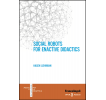Social Robots for Enactive Didactics
Synopsis
Released under the Creative Commons License Attribution-NonCommercial-NoDerivatives 4.0 International (CC BY-NC-ND 4.0) in the series Media e tecnologie per la didattica
The use of robotic technology in education over the past 25 years has primarily focused on STEM education in schools, and on computer science and engineering classes in undergraduate courses at universities. The increasing technological developments in socially evocative robotics has started to change this, and in recent years has led to an increasing number of social robotic platforms is being integrated into classroom settings. Due to the relative short time in which the social robotic revolution has happened, there is a lack of theoretical grounding for the use of social robots in education into contemporary didactics theory, specifically when taking ideas from didactic mediation and Enactive Didactics into consideration. The consequence of this limited theoretical grounding is that despite the availability of social robots like Pepper, their firm integration into school curricula around the world is still limited to only a number of cases, many of which still use the robots as experimental additions during the usual proceedings of the lessons.
In this book we will illustrate how current social robotic technology can be used to shape future learning from the perspective of an enactive approach to didactics. Our approach is based on the enactive approach to cognition, and is interwoven with ideas from didactic mediation theory. We will discuss the roles social robots can play for reinforcing different types feedback mechanisms between teacher and students and answer some of the, from our perspective, central questions about the grounding of social robots in didactic theory: what can the role of social robots be in the didactic process? Where are social robots situated in the in the process of didactic mediation? Can the integration of social robotics in education be a sustainable progressive development?
Downloads


